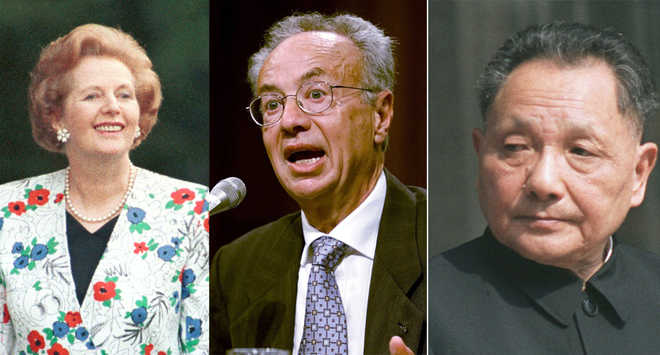
Changemakers: The book ends on a note of concern that the world today has become too complex for transformational leaders, with its laws and regulations that are often in conflict with each other
Rajdeep Bains
“This is the untold story of globalization”. This dramatic opening line of the introduction grabs attention and compels one to read on, and not without reason and satisfaction as we later learn. Jeffrey E. Garten teaches global economy at the Yale School of Management where he has been a dean in the past. Like all true experts, he manages to simplify a rather complicated concept and makes it easily understandable even to the average reader with a rudimentary knowledge of economics. The book also focuses on historical factors that shaped industry, changed the way we work, altered our climate and enriched our culture.
In this wide-ranging book, Garten has identified 10 extraordinary individuals (nine men and one woman) who “opened doors to a broad array of possibilities for progress… changed the prevailing paradigm of how society was organized… (and) raised the hopes of broad swaths of civilization”. Through their lives we learn about the very scope of globalisation.
He begins with Genghis Khan, who united East and West by subjugation, but also by opening new trade routes. The move was based on good communication, transportation and management. The next is Prince Henry of Portugal, whose naval expeditions set in motion the Age of Exploration. He is followed by Robert Clive, who laid the foundation of the British Empire. Mayer Amschel Rothschild, among the pioneers to expand the possibilities of global finance and usher in an era of global finance; Cyrus Field, who laid the first transatlantic telegraph cable, rolling out the march of modern telecommunications; John D. Rockefeller, the businessman who shaped the very DNA of the global oil industry, follow the other pioneers. Jean Monnet, who brought Europe together in the European Union; Margaret Thatcher, who led the rise of Britain’s economy by lowering the barriers to commerce among countries; Andrew Grove, the manager who made Intel a leader in the microprocessor industry; and Deng Xiaoping, the Chinese leader whose market reforms brought hundreds of millions of people into the global economy, make up the 10 icons.
Garten not only identifies each giant’s particular fingerprint, unique skills and qualities but also relates how it resonates with the present. Through their extraordinary lives and achievements, we see a pattern emerges that defines globalisation in all its nuances to us, and in doing so, balances the often untold stories: Genghis Khan, the builder against Genghis Khan, the destroyer; Prince Henry, the explorer, who was otherwise more known for being a slave trader; Robert Clive, the reformist, against with the opportunist, as we know him to be; Rockefeller, the philanthropist, as opposed to the win-at-all-cost monopolist….
Garten presents the view that for any individuals to contribute to globalisation, they had to be transformational leaders who virtually changed the world. Many of the individuals he mentions were not the only ones to do what they did, but they were the “first movers”, people who began a powerful, fundamental trend that had an impact on the world. Garten writes that the great age of exploration would have happened anyway, “but it was Henry who seized the moment”.
More importantly, through the varied roles of these individuals Garten showcases the different forms of endeavour that have gone into creating a global economy, from military action to exploration, from politics to the innovation of financial and technological systems.
His book ends on a note of concern that the world today has become too complex for transformational leaders, with its laws and regulations that are often in conflict with each other. Yet, Garten leaves us with the hope that the new environment can and will nurture new leaders at least as impressive as those mentioned in his book. Heroes shall emerge and the process of globalisation will live on.



























